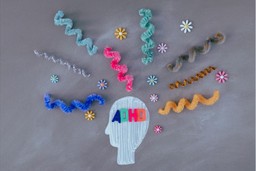ADHD is a neurodevelopmental disorder that is often diagnosed during childhood; however, it is also possible to be diagnosed with ADHD as an adult. In the US, it is estimated that there were 6 million (9.8%) children aged 3–17 who were diagnosed with ADHD between 2016 and 2019. It is also more likely to be diagnosed among boys than girls.
Signs and Symptoms of ADHD
Some of the common signs and symptoms of ADHD include difficulty focusing, acting without thinking, frequently forgetting things, being overly active, talking excessively, trouble controlling impulses, squirming or fidgeting constantly, having a hard time taking turns with others, and often making careless mistakes. The most common treatment options for ADHD include behavior therapy, training for parents, and medications.
ADHD in Adults
In the past, clinicians thought ADHD was a condition that children would ‘grow out of’. However, this is not true. ADHD is a lifespan disorder and is often overlooked among adults, and even more so in women.
Some of the challenges that adults with ADHD face affect their social, mental and emotional well-being. For instance, some may struggle to maintain jobs, keep up with household duties, have relationship troubles, and experience severe feelings of guilt, shame, and frustration.
These challenges manifest due to the negative impact that ADHD has on the brain’s executive function, memory, and ability to maintain focus and attention. Executive function is involved in prioritizing and managing the brain’s thoughts and actions. A person with ADHD may have trouble remembering important things and struggle to finish tasks.
Current Treatment Limitations
For adults, treatment strategies are similar to the ones available for children, such as stimulant medication and behavioral therapy. There are several limitations to the current medications that are offered for ADHD symptoms.
Stimulant medication is effective in decreasing symptoms in the short term. However, studies have shown that long-term medication use can cause the brain to adapt and reduce the efficacy of the treatment.
In addition, stimulant medication can cause many negative side effects, such as difficulty sleeping, headaches, insomnia, loss of appetite, and weight loss. Stimulants also exacerbate pre-existing cardiovascular conditions as some may increase heart rate and blood pressure. Suicidal ideation is a severe side effect of stimulant medications.
Therefore, the discovery of alternative ADHD treatment options can make a valuable impact on those struggling with the disorder.
Microdosing with Psychedelics on ADHD
Currently, there is a limited number of studies that investigate the therapeutic effect of microdosing. Evidently, low doses of psychedelics are generally well tolerated.
It is difficult to extrapolate the results for the general population because the studies were based on a small number of participants who were healthy and young. However, there is potential that microdosing psychedelics has beneficial effects in treating ADHD.
Here are two studies that looked at this:
A study used an online questionnaire to compare the standard prescribed treatments for mental and physiological disorders, and the self-rated effectiveness (SRE) of microdosing with psychedelics.
The survey was rolled out between March and July 2018, and participants were included if they were over the age of 18, had a clinical diagnosis for at least one mental or physiological disorder, and had microdosing experience. Effectiveness was measured with questions that asked whether microdosing worked, symptoms disappeared, and quality of life improved.
The results showed that participants rated the effectiveness of microdosing with psychedelics significantly higher than standard treatments for their mental or physiological disorders. Specifically, the effect was seen for those with ADHD/ADD, and anxiety disorders. The study concluded that future randomized controlled trials should further investigate the therapeutic effects of psychedelics and compare them to standard treatments.
A prospective study looked at the effect of microdosing with psychedelics on ADHD symptoms, time perception, and well-being. Participants included adults with ADHD who planned to begin self-medicating with psychedelic microdosing.
Their symptoms were measured at baseline before self-treatment, and follow-ups were performed at 2 and 4 weeks after, with sample sizes 233, 66, and 47, respectively.
The results showed a significant improvement in well-being and a reduction in ADHD symptoms. There was no change in time perception. The researchers measured whether standard medication use and having comorbidities influenced the effect of microdosing, and no effect was found. It concluded that placebo-controlled experimental studies are required to further understand how and why microdosing benefits ADHD symptoms.
Future Research — Current Clinical Trials
The number of studies that look at the impact of psychedelics on mental health conditions grows every month. Currently, there are clinical trials that are looking at the association between psychedelics and ADHD symptoms.
Mind Medicine is currently recruiting adult participants at Maastricht University in the Netherlands and at the University Hospital Basel in Switzerland for their clinical trial on the safety and efficacy of repeated low-dose LSD (MM-120) for ADHD. The study is randomized, double-blind, and placebo-controlled.
Both the placebo group and experimental group will consist of 26 participants. The placebo and experimental group will receive treatment with no therapeutic effect or 20 μg of MM-120 that is taken orally twice a week for 6 weeks, respectively.
The primary outcome measure includes a change in ADHD symptoms from the baseline. It is estimated that the study will be completed in November 2023.
The Washington University School of Medicine completed the recruitment phase of healthy adults for their brain imaging study on the effects of psilocybin (a serotonin receptor 2A agonist) on cortical and cortico-subcortical brain networks. The study uses a randomized, controlled, crossover design. There will be an experimental and an active comparator group.
The connection to ADHD is that the active comparator group will receive 40mg of methylphenidate (MTP). This is a stimulant medication used to treat ADHD and narcolepsy; the body processes MTP in a similar way as psilocybin. MTP has similar effects on blood pressure and heart rate as psilocybin.
The experimental group will orally take 25 mg of psilocybin during the first brain imaging sessions. At the second session, they will receive MTP.
Both participant groups will undergo brain imaging at baseline, followed by multiple imaging sessions with and without medication. The primary outcome measure will be establishing functional connectivity that explains the mechanism of psilocybin in the brain. Secondary outcome measures include mystical experiences and personality changes.
If the neuroimaging approach is successful in establishing a model that explains the mechanism of action of psilocybin on cortical and cortico-subcortical brain networks, the results will be a key step toward expanding the clinical research of psychedelics on mental health disorders—including ADHD.
If you are interested in participating in a psychedelic clinical trial, be sure to read our article that explains what to expect and how to get involved.
Follow your Curiosity
Sign up to receive our free psychedelic courses, 45 page eBook, and special offers delivered to your inbox.References
American Psychological Association. (2023). APA Dictionary of Psychology. Dictionary.apa.org. https://dictionary.apa.org/attention-deficithyperactivity-disorder
Centers for Disease Control and Prevention. (2020). What is ADHD? Centers for Disease Control and Prevention. Retrieved from https://www.cdc.gov/ncbddd/adhd/facts.html
Children and Adults with Attention-Deficit/Hyperactivity Disorder. (2018). Overview — CHADD. CHADD. https://chadd.org/for-adults/overview/
Haijen, E. C. H. M., Hurks, P. P. M., & Kuypers, K. P. C. (2022). Microdosing with psychedelics to self-medicate for ADHD symptoms in adults: A prospective naturalistic study. Neuroscience Applied, 1, 101012. https://doi.org/10.1016/j.nsa.2022.101012
Hutten, N. R. P. W., Mason, N. L., Dolder, P. C., & Kuypers, K. P. C. (2019). Self-Rated Effectiveness of Microdosing With Psychedelics for Mental and Physical Health Problems Among Microdosers. Frontiers in Psychiatry, 10. https://doi.org/10.3389/fpsyt.2019.00672
Mind Medicine, Inc. (2022, June 15). Safety and Efficacy of Repeated Low Dose d-Lysergic Acid Diethylamide (LSD) D-tartrate (MM-120) as Treatment for ADHD in Adults: a Multi-center, Randomized, Double-blind, Placebo-controlled Phase 2a Proof of Concept Trial. Clinicaltrials.gov. Identifier: NCT05200936. Retrieved from https://clinicaltrials.gov/ct2/show/study/NCT05200936
Nicol, G. E., & Washington University School of Medicine. (2022, November 22). Precision Functional Brain Mapping to Understand the Mechanisms of Psilocybin. Clinicaltrials.gov. Identifier: NCT04501653. Retrieved from https://clinicaltrials.gov/ct2/show/NCT04501653
Silberstein, R. B., Pipingas, A., Farrow, M., Levy, F., & Stough, C. K. (2016). Dopaminergic modulation of default mode network brain functional connectivity in attention deficit hyperactivity disorder. Brain and Behavior, 6(12). https://doi.org/10.1002/brb3.582
Totomanova, I. (2020). (PDF) Psychedelics as a Potential Treatment Option in ADHD. ResearchGate. Retrieved from https://www.researchgate.net/publication/348277534_Psychedelics_as_a_Potential_Treatment_Option_in_ADHD







